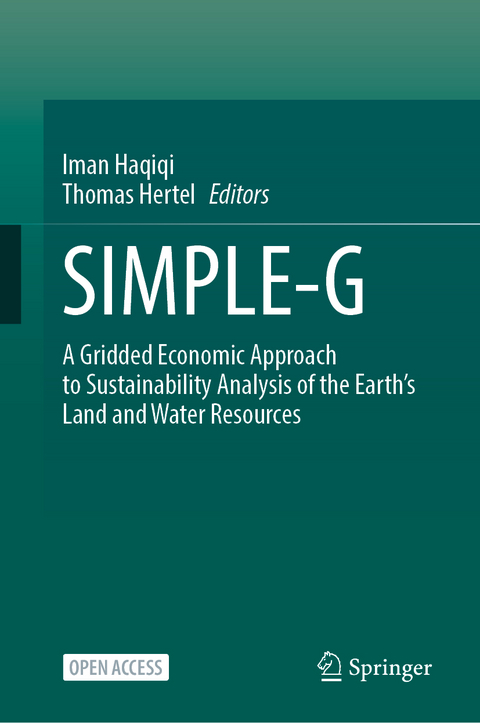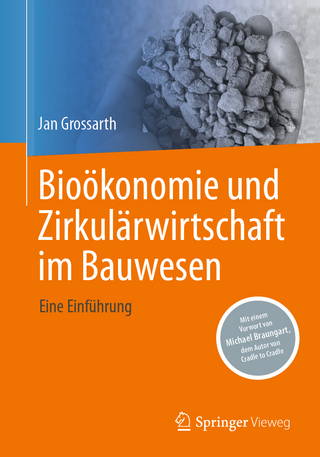
SIMPLE-G
Springer International Publishing (Verlag)
978-3-031-68053-3 (ISBN)
- Noch nicht erschienen - erscheint am 03.12.2024
- Versandkostenfrei innerhalb Deutschlands
- Auch auf Rechnung
- Verfügbarkeit in der Filiale vor Ort prüfen
- Artikel merken
Crafted for both the economist and the curious mind, this book introduces a novel approach to blending economic and biophysical sciences to enable multi-scale analysis of a range of sustainability challenges confronting the world's land and water resources at both local and global scales. It focuses specifically on the interface between the environment and food systems, utilizing economic theory to structure the overall framework. However, within the SIMPLE-G framework, there is ample room to incorporate fine-scale biophysical knowledge from agronomy, climate science, ecology, geography, hydrology, as well as a range of socioeconomic considerations. This enables multi-scale analyses incorporating grid cells that can vary in size from 250 meters to sub-regional scales. This, in turn, allows for investigation of global change drivers' impacts on local sustainability, as well as feedbacks from local sustainability policies to regional and global outcomes.
The book opens with a foreword by a prominent sustainability scientist, Prof. Navin Ramankutty, and proceeds in five parts covering, respectively: (1) introduction and overview, (2) basic economic theory underpinning SIMPLE-G, (3) the SIMPLE-G framework, including structure, data, parameters, computer implementation, and validation, (4) eight diverse applications of the SIMPLE-G framework, covering a range of geographies and sustainability challenges, and (5) a forward-looking chapter on future directions. The book provides step-by-step guidance on building and utilizing gridded models with real-world case studies demonstrating practical applications which will facilitate its use by academics, practitioners, and students conducting research on climate impacts, land-use, water resource management, food security, poverty, equity, nutritional outcomes, and overall sustainability.
This is an open access book.
Dr. Iman Haqiqi is a leading agricultural economist at Purdue University, recognized for his research on global trade and sustainability. His work within the Center for Global Trade Analysis and the Global to Local Analysis of Systems Sustainability (GLASS), has contributed significantly to our understanding of interactions of international agricultural trade, land use, water resources, and climate change. Dr. Haqiqi's approach to research is characterized by its global-to-local-to-global perspective, considering economic feedback and local conditions to address major sustainability and resilience challenges. His contributions to the field have earned him the prestigious Purdue Seed for Success Acorn Award, a testament to his innovative research.
Dr. Thomas Hertel is Distinguished Professor of Agricultural Economics at Purdue University. Prof. Hertel's research and teaching focuses on international trade, food and environmental security. He is a 2022 recipient of the Alexander von Humboldt Research Prize and is a Fellow, and a Past-President, of the Agricultural and Applied Economics Association (AAEA), Fellow of the American Academy for the Advancement of Science (AAAS) as well as the Australasian Agricultural and Resource Economics Society, and Honorary Life Member of the International Association of Agricultural Economists. He is also the founder and Executive Director of the Global Trade Analysis Project (GTAP) which now encompasses more than 28,000 researchers in 179 countries.
Chapter 1 Introduction.- Chapter 2 SIMPLE Economic Theory.- Chapter 3 Grid-level Analysis Using SIMPLE-G.- Chapter 4 Equilibrium Conditions and General Assumptions for a Quantitative Geospatial Economic Model.- Chapter 5 SIMPLE-G Model Specification.- Chapter 6 Benchmark Data.- Chapter 7 Behavioral Parameters.- Chapter 8 Computation and Baseline.- Chapter 9 Model Validation.- Chapter 10 The R&D Cost of Climate Mitigation in Agriculture.- Chapter 11 Gridded Implications of Total Factor Productivity Growth.- Chapter 12 Local Groundwater Sustainability Policies and Global Spillovers.- Chapter 13 The Role of Labor Markets in Determining the Efficacy and Distribution Impact of Sustainability Policies.- Chapter 14 Tackling Policy Leakage and Targeting Hot Spots Could Be Key to Addressing the "Wicked" Challenge of Nutrient Pollution from Corn Production in the United States.- Chapter 15 The Role of Transportation Infrastructure Expansion in the Transmission of Global Crop Price Shocks to the Brazilian Agriculture.- Chapter 16 Global Groundwater Sustainability and Virtual Water Trade.- Chapter 17 Interplay Between the Pandemic and Environmental Stressors.- Chapter 18 Future Directions.
| Erscheint lt. Verlag | 3.12.2024 |
|---|---|
| Zusatzinfo | X, 290 p. 74 illus., 72 illus. in color. |
| Verlagsort | Cham |
| Sprache | englisch |
| Maße | 155 x 235 mm |
| Themenwelt | Naturwissenschaften ► Biologie ► Ökologie / Naturschutz |
| Naturwissenschaften ► Geowissenschaften | |
| Schlagworte | Environmental Modeling • Environment and food systems • global change • interdisciplinary science • Multiscale Analysis • open access • Sustainability modeling |
| ISBN-10 | 3-031-68053-7 / 3031680537 |
| ISBN-13 | 978-3-031-68053-3 / 9783031680533 |
| Zustand | Neuware |
| Haben Sie eine Frage zum Produkt? |
aus dem Bereich


